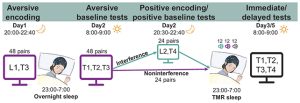Being able to erase bad memories and traumatic flashbacks could help in the treatment of a host of different mental health issues, and scientists have found a promising new approach to do just this: weakening negative memories by reactivating positive ones.
In an experiment covering several days, an international team of researchers asked 37 participants to associate random words with negative images, before attempting to reprogram half of those associations and ‘interfere’ with the bad memories.
For the study, the team used recognized databases of images classified as negative or positive – think human injuries or dangerous animals, compared with calm landscapes and smiling children.

Through questionnaires the next day and several days after, the researchers found that the volunteers were less able to recall the negative memories that had been scrambled with positive ones. Positive memories were more likely to pop into their heads than negative ones for these words, and were viewed with a more positive emotional bias.



Leave a Comment